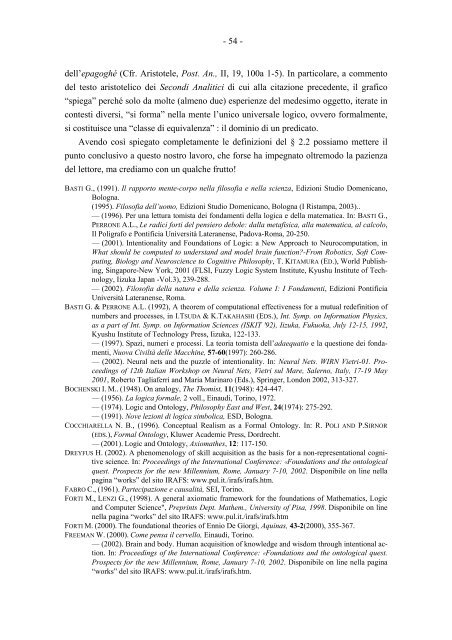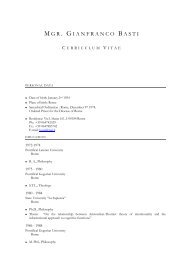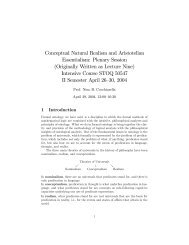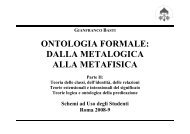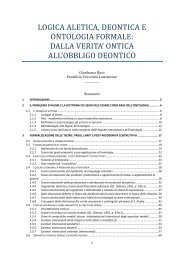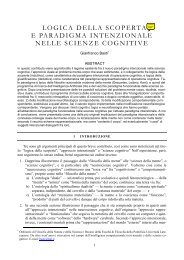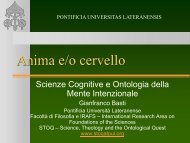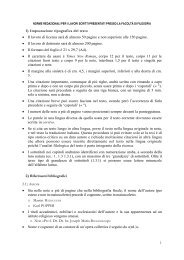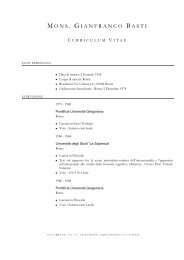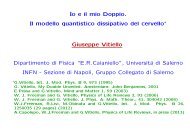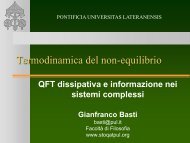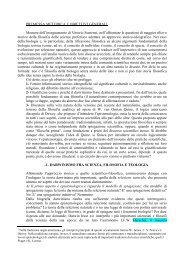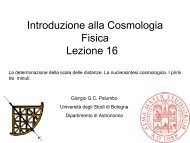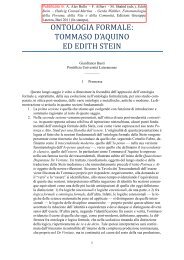analogia, ontologia formale e problema dei fondamenti - STOQ
analogia, ontologia formale e problema dei fondamenti - STOQ
analogia, ontologia formale e problema dei fondamenti - STOQ
- No tags were found...
You also want an ePaper? Increase the reach of your titles
YUMPU automatically turns print PDFs into web optimized ePapers that Google loves.
- 54 -dell’epagoghé (Cfr. Aristotele, Post. An., II, 19, 100a 1-5). In particolare, a commentodel testo aristotelico <strong>dei</strong> Secondi Analitici di cui alla citazione precedente, il grafico“spiega” perché solo da molte (almeno due) esperienze del medesimo oggetto, iterate incontesti diversi, “si forma” nella mente l’unico universale logico, ovvero formalmente,si costituisce una “classe di equivalenza” : il dominio di un predicato.Avendo così spiegato completamente le definizioni del § 2.2 possiamo mettere ilpunto conclusivo a questo nostro lavoro, che forse ha impegnato oltremodo la pazienzadel lettore, ma crediamo con un qualche frutto!BASTI G., (1991). Il rapporto mente-corpo nella filosofia e nella scienza, Edizioni Studio Domenicano,Bologna.(1995). Filosofia dell’uomo, Edizioni Studio Domenicano, Bologna (I Ristampa, 2003)..— (1996). Per una lettura tomista <strong>dei</strong> <strong>fondamenti</strong> della logica e della matematica. In: BASTI G.,PERRONE A.L., Le radici forti del pensiero debole: dalla metafisica, alla matematica, al calcolo,Il Poligrafo e Pontificia Università Lateranense, Padova-Roma, 20-250.— (2001). Intentionality and Foundations of Logic: a New Approach to Neurocomputation, inWhat should be computed to understand and model brain function?-From Robotics, Soft Computing,Biology and Neuroscience to Cognitive Philosophy, T. KITAMURA (ED.), World Publishing,Singapore-New York, 2001 (FLSI, Fuzzy Logic System Institute, Kyushu Institute of Technology,Iizuka Japan -Vol.3), 239-288.— (2002). Filosofia della natura e della scienza. Volume I: I Fondamenti, Edizioni PontificiaUniversità Lateranense, Roma.BASTI G. & PERRONE A.L. (1992), A theorem of computational effectiveness for a mutual redefinition ofnumbers and processes, in I.TSUDA & K.TAKAHASHI (EDS.), Int. Symp. on Information Physics,as a part of Int. Symp. on Information Sciences (ISKIT '92), Iizuka, Fukuoka, July 12-15, 1992,Kyushu Institute of Technology Press, Iizuka, 122-133.— (1997). Spazi, numeri e processi. La teoria tomista dell’adaequatio e la questione <strong>dei</strong> <strong>fondamenti</strong>,Nuova Civiltà delle Macchine, 57-60(1997): 260-286.— (2002). Neural nets and the puzzle of intentionality. In: Neural Nets. WIRN Vietri-01. Proceedingsof 12th Italian Workshop on Neural Nets, Vietri sul Mare, Salerno, Italy, 17-19 May2001, Roberto Tagliaferri and Maria Marinaro (Eds.), Springer, London 2002, 313-327.BOCHENSKI I. M.. (1948). On analogy, The Thomist, 11(1948): 424-447.— (1956). La logica <strong>formale</strong>, 2 voll., Einaudi, Torino, 1972.— (1974). Logic and Ontology, Philosophy East and West, 24(1974): 275-292.— (1991). Nove lezioni di logica simbolica, ESD, Bologna.COCCHIARELLA N. B., (1996). Conceptual Realism as a Formal Ontology. In: R. POLI AND P.SIRNOR(EDS.), Formal Ontology, Kluwer Academic Press, Dordrecht.— (2001). Logic and Ontology, Axiomathes, 12: 117-150.DREYFUS H. (2002). A phenomenology of skill acquisition as the basis for a non-representational cognitivescience. In: Proceedings of the International Conference: «Foundations and the ontologicalquest. Prospects for the new Millennium, Rome, January 7-10, 2002. Disponibile on line nellapagina “works” del sito IRAFS: www.pul.it./irafs/irafs.htm.FABRO C., (1961). Partecipazione e causalità, SEI, Torino.FORTI M., LENZI G., (1998). A general axiomatic framework for the foundations of Mathematics, Logicand Computer Science", Preprints Dept. Mathem., University of Pisa, 1998. Disponibile on linenella pagina “works” del sito IRAFS: www.pul.it./irafs/irafs.htmFORTI M. (2000). The foundational theories of Ennio De Giorgi, Aquinas, 43-2(2000), 355-367.FREEMAN W. (2000). Come pensa il cervello, Einaudi, Torino.— (2002). Brain and body. Human acquisition of knowledge and wisdom through intentional action.In: Proceedings of the International Conference: «Foundations and the ontological quest.Prospects for the new Millennium, Rome, January 7-10, 2002. Disponibile on line nella pagina“works” del sito IRAFS: www.pul.it./irafs/irafs.htm.


